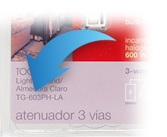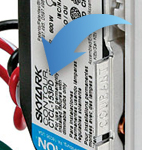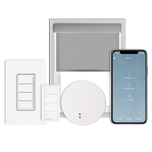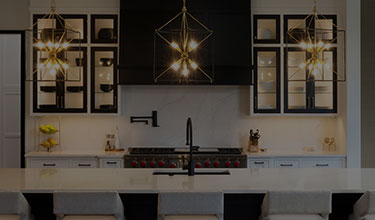Explore Knowledge Articles

Introducing RadioRA 3
Lutron raises the bar once again. 10 years in the making, RadioRA 3 is a new, game-changing system that promises to transform the way your residential clients look at lighting control.
How do I find my Model Number?
Do you have the original packaging?
-
If your product came in plastic packaging (a clamshell), you’ll find the model number on the front of the insert card, on the lower left corner. If your product came in a box, you’ll find the model number on the top of the box.
Most model numbers are 12-16 characters and start with a couple letters followed by a dash.

No packaging? No problem!
-
The product number is on a label on the side of the dimmer or switch.*
If you’ve already installed the dimmer/switch, turn off the electricity and then remove the wallplate. Unscrew and remove the wallplate adapter, then unscrew the dimmer/switch and pull it out of the wall until you can see the label.
*Please note: The product number for Ariadni/Toggler dimmers is not on a label. It’s located directly on the front of the dimmer on the top left, or right below the on/off toggle.

Get help your way
How do I find my Model Number?
Do you have the original packaging?
-
If your product came in plastic packaging (a clamshell), you’ll find the model number on the front of the insert card, on the lower left corner. If your product came in a box, you’ll find the model number on the top of the box.
Most model numbers are 12-16 characters and start with a couple letters followed by a dash.

No packaging? No problem!
-
The product number is on a label on the side of the dimmer or switch.*
If you’ve already installed the dimmer/switch, turn off the electricity and then remove the wallplate. Unscrew and remove the wallplate adapter, then unscrew the dimmer/switch and pull it out of the wall until you can see the label.
*Please note: The product number for Ariadni/Toggler dimmers is not on a label. It’s located directly on the front of the dimmer on the top left, or right below the on/off toggle.

- Browse Components
-
If you don't know your model number, try browsing for it here
If you don't know your model number, try browsing for it here
6-Port FrameBNC JackCable TV JackFiber JackNetwork PortTelephone JackTelephone PortMaestro DimmersPlug-In DimmerRF Dimming ModuleSunnata DimmersAccessoriesPico WirelessseeTouch KeypadsSunnata KeypadsTable Top KeypadsFluorescent Power ModulePhase Adaptive Power ModuleSwitching Power ModuleRadioRA 3 Processor15 A Receptacles20 A ReceptaclesCeiling SensorsCorner SensorsHallway SensorsMounting AccessoriesWall SensorsAccessoriesMaestro SwitchesRF Relay ModuleSunnata Switches -

RadioRA 3


- Does the processor count as a device in the new system?
- How do I setup and configure the new processor?
-
How does the new processor work with RadioRA 3?
The new all-in-one processor combines the functionality of the RadioRA 2 main repeater and Connect bridge to enable control from the Lutron app, wall controls, Pico remotes and integrated voice assistants. The processor is powered by PoE (via CAT5e, or better, Ethernet cable). This allows for the processor to be centrally located within the home for optimal RF coverage. The processor supports integrations with other connected brands for a truly customized solution and can control up to 200 Lutron devices.
- How is the new processor powered?
-
I have an Application that requires more than 100 CCX Devices / 200 Combined Clear Connect Devices. What are my options?
Two RadioRA 3 processors can be combined into the same project to allow for larger system capabilities that exceed 100 CCX devices or 200 combined devices. For more information, refer to the Knowledge Article, here, that provides a more detailed overview of the system and its architecture.
-
What are the neutral wire requirements for RadioRA 3?
The Sunnata RF Dimmer with PRO LED+ technology (RRST-PRO-N-XX) requires a neutral wire and offers easy wiring with screw terminals, no connectors required. If the installation site does not have neutral wires, the Maestro RF Dimmer with PRO LED+ technology (RRD-PRO-XX) is compatible with RadioRA 3 and does not require a neutral wire (it is optional).
-
What are the system device limits and range limitations?
Each RadioRA 3 system can have up to 95 seeTouch keypads, Maestro dimmers/switches/fan controls, Pico wireless controls, occupancy sensors, and shades. In addition, systems can have up to 100 Sunnata keypads, dimmers and switches. SeeTouch, Maestro, Pico, Sensor, and shade devices must be within 30ft of the processor or a repeater. Repeaters must be located within 60ft of each other. For Sunnata devices, the processor and each Sunnata device should be within 25ft of two other Sunnata devices. All Sunnata devices should be located within 75ft from the processor.
-
What can I do for under cabinet lighting? Compatible LEDs options?
Under cabinet lighting is typically a thinner profile, linear LED lighting that is either a bare strip or a strip mounted to a metal extrusion. These lights are typically powered by an externally mounted LED driver or power supply, providing 12V or 24V constant voltage power. With RadioRA 3, multiple options are available. Pro LED+ technology in Sunnata and Maestro dimmers offers superior LED dimming performance and may be compatible with a 3rd party under cabinet lighting tape and driver. Lutron also offers constant voltage drivers that can be used to power 3rd party linear tape lighting and would be controlled by a forward phase dimmer such as the Sunnata LED+ dimmer. Additionally, Lutron offers Lumaris Linear lighting by Ivalo which would also be tied to a forward phase dimmer.
-
What do I need to know about Power over Ethernet and the new system processor?
At a high level, PoE is simply a set of standards involving the use of Ethernet cable to pass power from a supply to a connected device in addition to the traditional function of the cable which is to carry communication data in a network. While there are multiple standards, the RadioRA 3 processor can be powered using either the original standard of PoE, IEEE 802.3af-2003, or PoE+, 802.3at-2009. The PoE power is typically either generated by a PoE compliant switch where both power and communication are provided from each port directly or using a PoE injector which is used to power a PoE device on a network that uses standard, non-PoE switches.
-
What is the difference between ‘Programming’ vs. ‘Configuration’?
RadioRA 3 offers both a Windows-based programming software and a mobile app. Programming is what is performed within the PC programming software and is a more advanced activity performed by the professional and typically requires training to become proficient. Configuration is available using the Lutron App, allowing for the ability to customize your experience, as either the professional or end user, in a much more simplified user experience.
-
What is the system device count?
Each RadioRA 3 processor controls up to 200 Lutron devices. Up to 100 Clear Connect Type X devices (Sunnata) + 100 RadioRA 2 & RA2 Select Devices (95 including the Processor and 4 Repeaters).
-
What steps do I need to take to upgrade from RadioRA 2 to RadioRA 3?
RadioRA 3 is backwards compatible and RadioRA 2 devices, including the Main Repeater, do not need to be factory defaulted. The activation information will be saved when the project is converted to RadioRA 3. Keep installed legacy gear (some exclusions apply) and expand with the new RadioRA 3 devices. When converting the project to RA3 you can skip device activation for dimmers, switches, shades and more if you leave the RA2 system in its previous state. Enable upgrade of existing RadioRA 2: 1) Replace the main repeater & connect bridge with a RadioRA 3 processor. 2) Open the RadioRA 2 File in RadioRA 3 to convert the project. 3) Use the Lutron Designer software to program the system, activate newly added devices, and transfer to the new RadioRA 3 processor.
-
When should I use a Pico Remote vs. a Companion Dimmer?
Pair a companion dimmer when looking to control light(s) from two or more locations with multi-location dimming. With the same look and feel, you can add up to four Sunnata RF companion dimmers for RadioRA 3 with one primary dimmer to dim up to five locations. You can obtain this with conventional 3-way and 4-way wiring. When using a Pico, you have the option of installing the Pico control on an existing wall box with the PICO-WBX-ADAPT wall-mount adapter, adding a new switch location without running wiring or cutting drywall, or using the Pico as a handheld remote. We also offer pedestals for more elegant remote installations. Additionally, Picos can control more than 1 lighting zone through system programming and come in a variety of engraving options. Available Pico Model Numbers.





